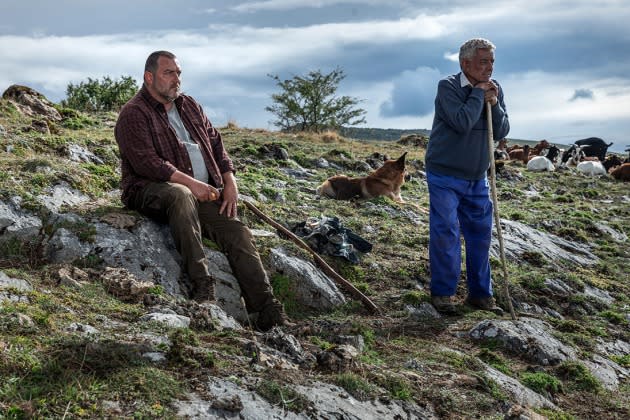‘The Beasts’ Review: Spanish Director Rodrigo Sorogoyen’s Searing Small-Town Thriller

It’s hard to think of a less suspenseful set-up than the one writer-director Rodrigo Sorogoyen took on for his nail-biting new feature, The Beasts (As Bestas), which swept last year’s Goya awards in Spain.
In a tiny village lost in the hills of Galicia, a French couple has decided to restart their lives as organic farmers, selling produce at the town market while fixing up abandoned old houses in their downtime. The wife, Olga (Marina Foïs), and husband, Antoine (Denis Ménochet), are a gentle and thoughtful middle-aged pair, concerned by environmental issues and adept enough in Spanish to do business with the locals.
More from The Hollywood Reporter
And yet, from its very first minute, this searing drama of rural strife, xenophobia and cultural hostility is filled with almost unbearable tension — a tension that boils over as Olga and Antoine clash with a pair of native-born brothers, Xan (Luis Zahera) and Lorenzo (Diego Anido), who live just down the street and have a major gripe with their new neighbors.
Sorogoyen and co-scribe Isabel Peña were inspired by a true story that took place over a decade ago, involving a Dutch couple who fell into the same predicament. They’ve changed some of the details and lowered the ages of the protagonists, but the conflict at the heart of The Beasts is the same, pitting new ways against old ones and immigrants against nationals. It’s a bleak and unforgiving portrait of Spain that recalls two of the director’s earlier films, May God Save Us (2016) and The Candidate (2018), depicting a nation beset by corruption, traditionalism and chauvinism taken too far.
When the movie begins, the war between the Frenchies and the brothers has already been going on for some time, sparked by Olga and Antoine voting against the installation of income-generating wind turbines within the town’s vicinity. Ironically, they did so to preserve the very land Xan and Lorenzo grew up on, but the latter two, who spend a lot more time drinking than working, only see easy money going out of their pockets.
We learn about all of this gradually — and initially from Antoine’s point of view as he tries to keep his farm afloat while dealing with the constant threats from his neighbors. At first, it’s just a few off-putting comments at the tiny town bar where they all gather. But things start to snowball when the threats become more visceral, with Xan and Lorenzo blocking Antoine’s way on the road back home or dropping a pair of car batteries into his water well, spoiling the crops that are the French couple’s only livelihood.
These menacing excursions onto Antoine and Olga’s property, which overlooks the verdant Galician hills, feel like scenes out of a western (Sorogoyen mentioned High Noon as an inspiration in the press notes). But there’s a bitter and violent tone of hatred here that’s more reminiscent of 70s thrillers like Straw Dogs or Deliverance, where backwards country bumpkins take out their grievances on innocent newcomers.
The tension is felt each time Antoine steps out of his house, where he’s suddenly a stranger in a hostile land. Ménochet, a bear of an actor whose eyes convey both world-weariness and explosive rage, doesn’t have to do much to up the suspense at every turn. You just know things aren’t going to resolve themselves well and, when the big scene finally happens, what’s shocking is how inevitably hopeless it seems. Sorogoyen stages it less as a duel of death than as a brutal manifestation of unfettered Spanish machismo.
The film’s second half switches to Olga’s viewpoint, and while it’s never marked by the same underlying violence, it further explores the chasm separating the foreigners from the natives, including a pair of gendarmes who are meant to offer protection. When the couple’s 20-something daughter, Marie (the excellent Marie Colomb), finally shows up for a visit, she has the same reaction the viewer does: Why would anyone want to stay in a place where they’re so unwelcome?
Foïs’ character doesn’t provide a convincing answer, stubbornly clinging to the only thing she has, holding onto a dream that turned into a nightmare a long time ago. The French actress portrays Olga as an honorable woman who was blinded by love before it was too late, and who would rather deal with the consequences than attempt to move on.
As two men who gave up on their dreams way before the film even started, Zahera (a Sorogoyen regular) and Anido are completely unsettling, couching the brothers’ bitterness in a litany of passive-aggressive language and behavior. In one memorable scene, Lorenzo offers Antoine a ride home when the latter’s truck breaks down, only to step on the gas every time Antoine tries to climb in. What starts as a stupid little joke, or some kind of neighborly hazing, quickly transforms into an act of outright cruelty.
Sorogoyen stages this and other sequences as simply as possible, letting the action play out without overdoing the sound design, cutting or camerawork. The Galician locations are so inspiring that cinematographer Alejandro de Pablo often pulls back to shoot them in wide shots, capturing the rustic beauty behind which so many dark events unfold. The picturesque Spanish town actually seems like a great place to live, if it weren’t for the people.
Best of The Hollywood Reporter
'Barbie' and Beyond: A Look at Margot Robbie's Career Highlights
Natalie Portman at Cannes: "I Need to Leave the Drama for the Screen"
